
Many dog owners wonder if it is safe for their furry friends to indulge in the crunchy delight of pork rinds. While dogs may be curious about this popular snack, it’s important to understand the potential risks involved before giving in to their cravings.
- Pork rinds are not safe for dogs to eat due to their high fat, sodium, and calorie content.
- The seasoning and additives in pork rinds can be toxic to dogs, leading to health issues.
- Instead of pork rinds, consider offering your dog healthier alternatives such as dehydrated pork treats.
- Consult with your veterinarian about your dog’s diet and any specific concerns you have about feeding them certain foods.
- Always prioritize your dog’s health and well-being by making informed choices about their diet.
When it comes to your furry friend’s diet, it’s essential to provide them with nutritionally balanced meals and snacks that support their overall health. While pork rinds may seem tempting, it’s best to steer clear and opt for dog-friendly alternatives that will keep your canine companion happy and healthy.
Understanding the Risks: Safety of Pork Rinds for Dogs
While pork rinds may be a popular snack for humans, they can pose risks to our canine companions. These crunchy treats are high in fat, sodium, and calories, which can have detrimental effects on our dogs’ health. The digestive systems of dogs are not designed to handle the high-fat content of pork rinds, and consuming them can lead to gastrointestinal upset and discomfort.
Additionally, the seasoning and additives used in pork rinds, such as spicy flavors or garlic and onion seasonings, are toxic to dogs. These ingredients can cause various health issues, including digestive disturbances and even damage to internal organs. It is important to note that even plain, unseasoned pork rinds should be avoided due to their high fat and sodium content.
Instead of feeding your dog pork rinds, consider healthier alternatives such as dehydrated pork treats. These options provide a similar crunchy texture without the risks associated with pork rinds. However, always consult with your veterinarian before introducing any new food items to your dog’s diet, including alternative treats. Your vet can provide guidance based on your dog’s individual dietary needs and any specific concerns you may have about pork rinds or other foods.
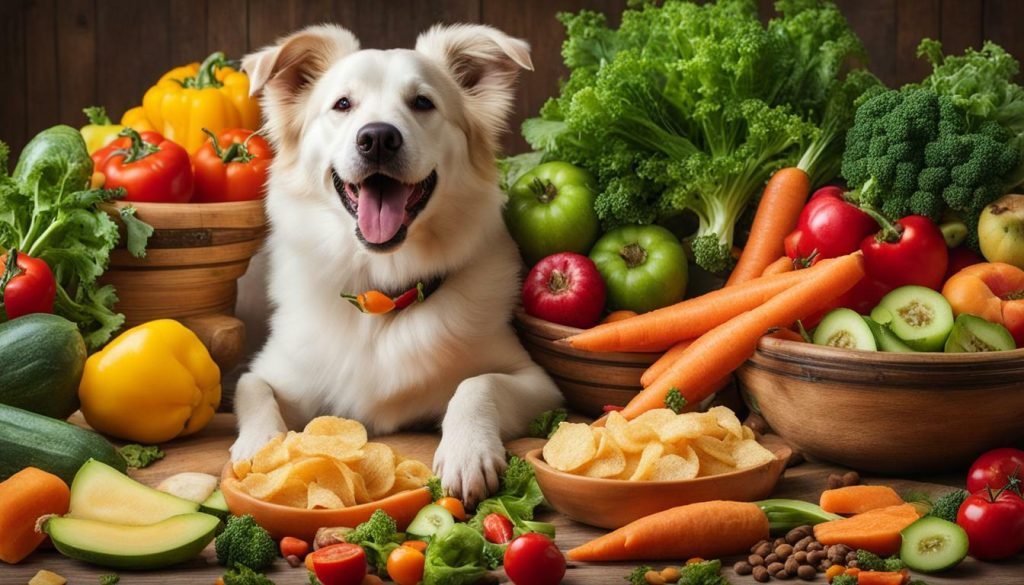
In conclusion, pork rinds are not a safe snack for dogs. Their high fat, sodium, and calorie content, as well as the toxic seasoning and additives, can lead to a variety of health issues. It is best to prioritize your dog’s wellbeing by opting for healthier snack options like dehydrated pork treats and always seeking guidance from your veterinarian regarding their diet.
Health Implications: The Dangers of Pork Rinds for Dogs
Feeding pork rinds to your dog can have negative consequences for their overall health and well-being. These crunchy snacks may be tempting, but they are far from suitable for canine consumption. Let’s explore the potential health issues that can arise from dogs eating pork rinds.
Pork rinds are notoriously high in fat, sodium, and calories. While these may not be a concern for humans in moderation, they can pose significant risks for our furry friends. The excess fat content in pork rinds can contribute to obesity in dogs, leading to a host of health problems such as joint pain, heart disease, and reduced lifespan.
Not only are pork rinds high in fat, but they also contain seasoning and additives that can be toxic to dogs. Spicy flavors and seasonings like garlic or onion, commonly found in pork rinds, can cause digestive issues and even damage a dog’s red blood cells. It’s essential to keep these harmful ingredients away from your canine companion.

So, what are the alternatives? Instead of pork rinds, consider offering your dog healthier snack options. Dehydrated pork treats can provide a similar crunchy texture while being more suitable for their dietary needs. Always consult with your veterinarian for guidance on your dog’s specific dietary requirements and any concerns you may have about feeding them certain foods.
Remember, your dog’s health should always be a priority. By avoiding feeding them pork rinds and opting for healthier alternatives, you can help them live a longer, happier life.
Obesity Concerns: Pork Rinds and Weight Gain in Dogs
Dogs that consume pork rinds regularly may be at a higher risk of developing obesity. These crunchy snacks are high in fat and calories, which can contribute to weight gain in our furry friends. As responsible pet owners, it’s important to be mindful of our dog’s diet and provide them with healthy alternatives to avoid the potential health consequences associated with obesity.

Obesity in dogs can lead to a myriad of health problems, including joint issues, heart conditions, and a reduced lifespan. Pork rinds, with their high fat content, can be a contributing factor in the development of obesity. It’s crucial to remember that dogs have different dietary needs than humans, and what may seem like a harmless treat to us can have significant implications for their health.
Instead of offering your dog pork rinds, consider healthier alternatives such as dehydrated pork treats or homemade dog-friendly snacks. These options provide the satisfying crunch that dogs enjoy without the excess fat and sodium. Additionally, consulting with your veterinarian about your dog’s diet can help tailor their nutrition to their specific needs, ensuring their overall well-being and avoiding potential weight issues.
Remember, our canine companions rely on us to make informed decisions about their diet. By avoiding pork rinds and choosing healthier alternatives, we can prioritize their health and well-being, keeping them happy and thriving for years to come.
Pancreatitis Risk: Pork Rinds and Canine Pancreas
Dogs that consume pork rinds may be more susceptible to developing pancreatitis. Pancreatitis is a condition characterized by inflammation of the pancreas, which can cause abdominal pain, vomiting, diarrhea, and other digestive issues in dogs. The high fat content of pork rinds puts a strain on a dog’s pancreas, potentially leading to inflammation and complications.
To better understand the risks of pancreatitis in dogs, it’s important to note that their digestive systems are different from ours. While we may enjoy indulging in fatty snacks, dogs have a harder time digesting and metabolizing high-fat foods. Their bodies are not designed to handle the excessive levels of fat found in pork rinds, which can overload their pancreas and trigger an inflammatory response.
It’s essential for dog owners to recognize the symptoms of pancreatitis and seek veterinary care if they suspect their pet may be affected. Early detection and treatment can prevent further complications and improve the dog’s overall well-being. Remember, prevention is key, and avoiding feeding your dog pork rinds is a simple way to reduce the risk of developing pancreatitis.
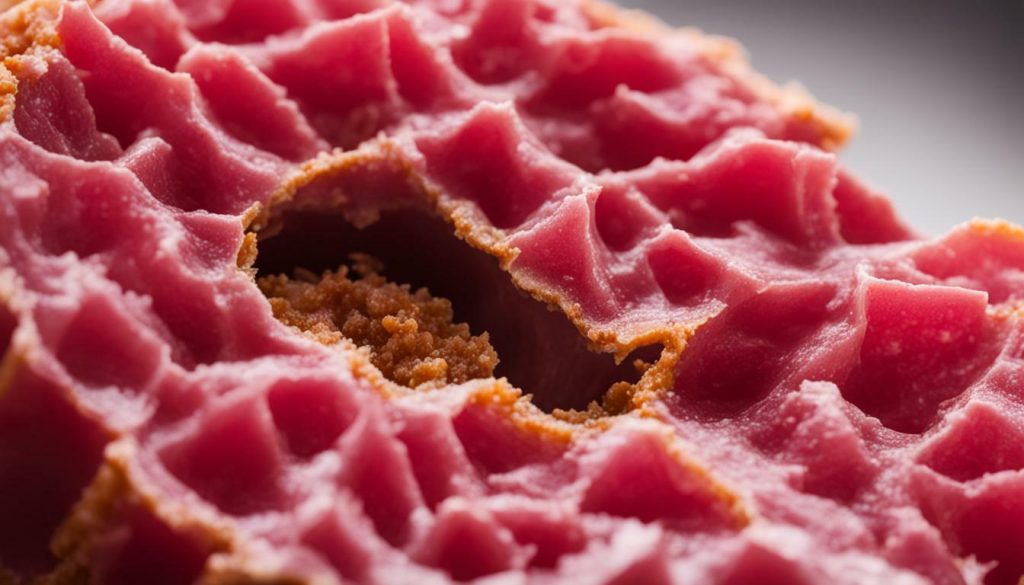
As responsible pet owners, it’s crucial to prioritize our dogs’ health and well-being. Instead of giving them pork rinds, there are plenty of healthier alternatives available. Consider offering dehydrated pork treats that are specifically made for dogs. These treats provide a similar crunchy texture without the harmful effects of pork rinds. When introducing any new food to your dog’s diet, it is always best to consult with your veterinarian to ensure it is safe and suitable for your pet.
Salt Poisoning: The Dangers of Sodium in Pork Rinds for Dogs
The high sodium levels in pork rinds can lead to salt poisoning in dogs, which can have severe consequences. Dogs are more sensitive to salt than humans, and their bodies have a harder time processing and excreting excess sodium. If a dog consumes too much salt, it can disrupt their electrolyte balance and lead to dehydration, excessive thirst, vomiting, diarrhea, seizures, and even death.
It’s important to note that pork rinds are typically seasoned with additional salt, making them even more dangerous for dogs. The combination of their high salt content and the seasoning additives can quickly escalate the risk of salt poisoning. As a responsible pet owner, it’s crucial to be aware of these dangers and avoid feeding pork rinds to your furry friend.
Instead of giving your dog pork rinds, consider healthier alternatives such as dehydrated pork treats that are specifically made for canines. These treats are typically lower in fat and sodium and provide a safe and flavorful snacking option for your four-legged companion. Always consult with your veterinarian about your dog’s individual dietary needs and any concerns you may have regarding specific foods.
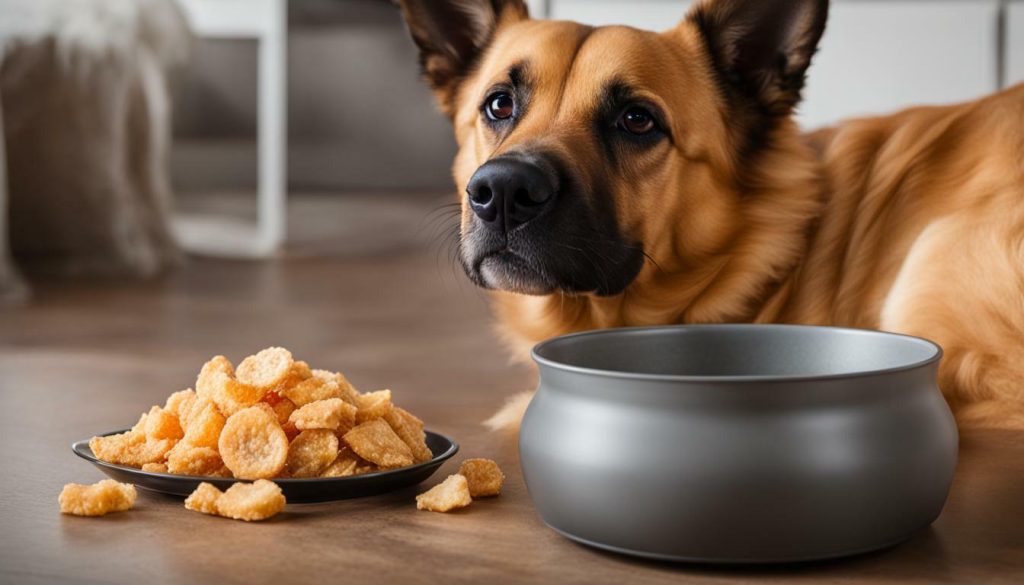
To summarize, pork rinds are not safe for dogs due to their high fat, sodium, and calorie content. Feeding your dog pork rinds can lead to various health issues, including obesity, pancreatitis, and salt poisoning. It’s essential to prioritize your dog’s well-being and opt for healthier alternatives that are specifically formulated for canine consumption. Remember, when it comes to your dog’s diet, always consult with your veterinarian for personalized advice and guidance.
Seeking Alternatives: Dog-Friendly Pork Rind Substitutes
If you’re looking to provide your dog with a satisfying crunch, there are safer alternatives to pork rinds that you can consider. These alternatives offer a tasty and healthy option for your furry friend while avoiding the potential risks associated with pork rinds. One such alternative is dehydrated pork treats. Dehydrated pork provides a similar texture and flavor to pork rinds, but without the added fat, sodium, and seasoning that can be harmful to dogs.
Dehydrated pork treats are made by slowly removing moisture from the meat, resulting in a crunchy and flavorful snack that dogs love. These treats are typically made from high-quality cuts of lean pork, ensuring a protein-rich and nutritious option for your canine companion. They are also free from any harmful additives or seasonings, making them a safe choice for dogs of all ages and sizes.
When choosing dehydrated pork treats for your dog, look for options that are made from natural ingredients and do not contain any artificial preservatives or flavors. It’s always a good idea to check the ingredient list to ensure that the treats are free from any potential allergens or ingredients that your dog may be sensitive to. Consulting with your veterinarian can also provide valuable guidance on choosing the best treats for your dog’s specific dietary needs.
Table: Comparison of Dog-Friendly Pork Rind Substitutes
| Alternative | Benefits | Considerations |
|---|---|---|
| Dehydrated Pork Treats | High in protein, crunchy texture, natural ingredients | Potential allergens, individual sensitivities |
| Carrot Sticks | Low in calories, high in fiber, promote dental health | Choking hazard for small dogs, monitor portion sizes |
| Apple Slices | Rich in vitamins and antioxidants, aid in digestion | Remove seeds and core to avoid choking, moderation for dogs with diabetes |
| Rice Cakes | Low in fat, easy to digest, variety of flavors available | Potential for added salt or flavorings, check ingredient list |
Other safe alternatives to pork rinds include carrot sticks, apple slices, and rice cakes. Carrot sticks are low in calories and high in fiber, making them a healthy choice for dogs. They also help promote dental health by naturally cleaning your dog’s teeth and gums as they chew. However, it’s important to monitor portion sizes and consider potential choking hazards, especially for small dogs.
Apple slices are another great option, providing a sweet and nutritious alternative to pork rinds. Apples are rich in vitamins and antioxidants, and they aid in digestion. Remember to remove the seeds and core to avoid any choking hazards. For dogs with diabetes, moderation is key due to the natural sugar content in apples.
Rice cakes, available in a variety of flavors, offer a low-fat and easily digestible option for your dog’s snacking pleasure. However, be cautious and check the ingredient list, as some rice cakes may contain added salt or flavorings that could be harmful to dogs. Opt for plain or lightly flavored rice cakes to ensure the safest choice.
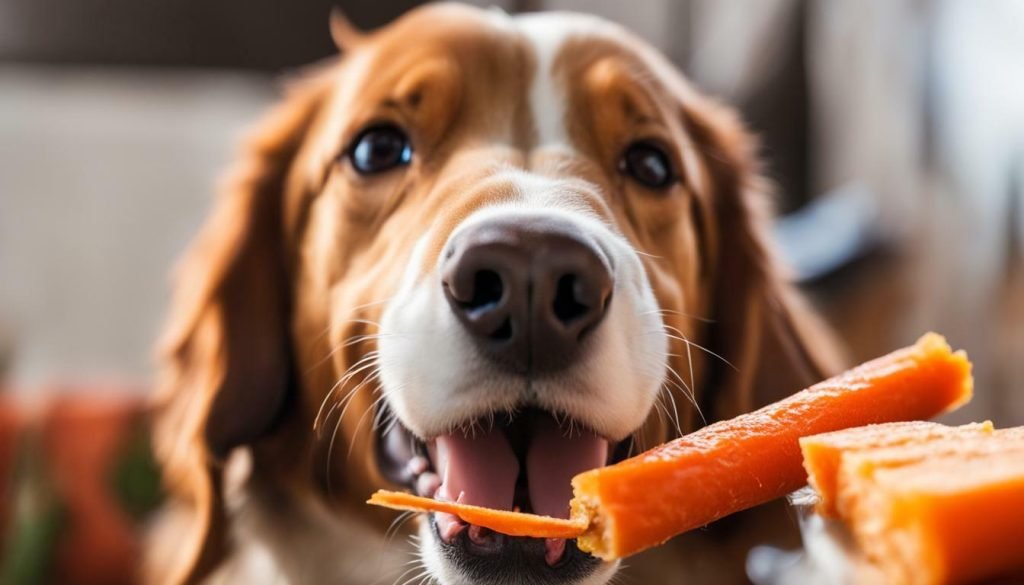
It is crucial to consult your veterinarian regarding your dog’s diet, especially when it comes to introducing potentially risky foods like pork rinds. Every dog is unique, with different dietary needs and sensitivities, so it’s essential to seek professional advice before making any changes to their feeding routine. Your veterinarian will be able to provide personalized recommendations based on your dog’s age, breed, weight, and overall health.
During your consultation, make sure to discuss your concerns about feeding pork rinds to your dog. Your veterinarian can explain the potential risks associated with this snack, such as the high fat and sodium content, as well as the seasoning and additives that can be harmful to dogs. They can also provide guidance on alternative treats that are safe and healthier for your canine companion.
In addition to speaking with your veterinarian, you can also consider working with a veterinary nutritionist who specializes in formulating balanced and tailored diets for dogs. These professionals can provide expert guidance on creating a well-rounded and nutritious meal plan that meets your dog’s specific needs.
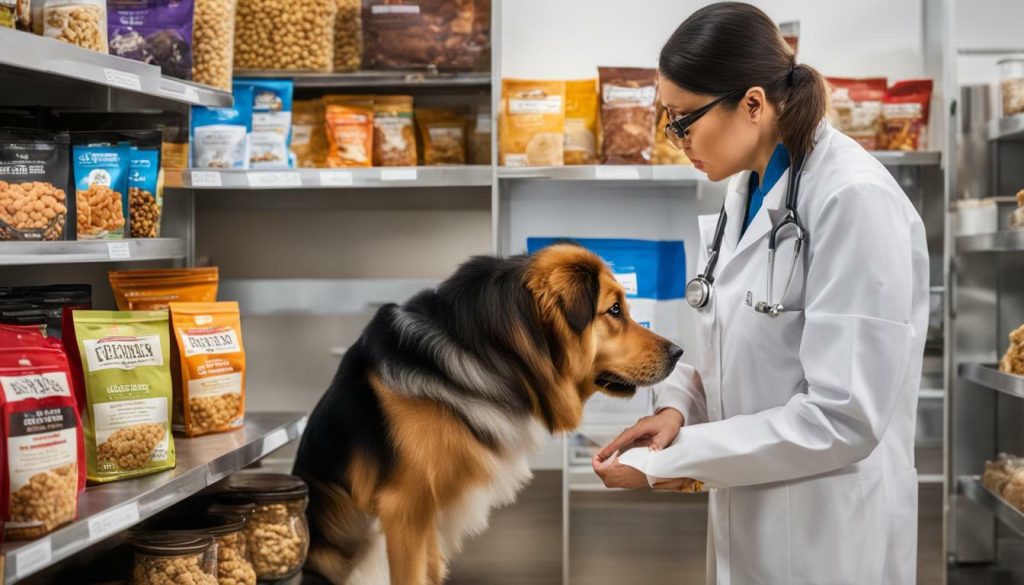
Remember, when it comes to your dog’s diet, it’s always better to be safe than sorry. By consulting with your veterinarian and seeking expert advice, you can ensure that you are providing the best nutrition for your furry friend and avoiding any potential risks or complications.
Conclusion: To Feed or Not to Feed Pork Rinds to Dogs
While the temptation to share your snack with your furry friend may be strong, it is best to avoid feeding pork rinds to dogs due to the potential health risks involved. Pork rinds are not safe for dogs to consume, as they contain high levels of fat, sodium, and calories, which can lead to various health issues.
The high-fat content in pork rinds can contribute to obesity in dogs, increasing the risk of related health problems such as joint pain, heart disease, and diabetes. Additionally, the seasoning and additives used in pork rinds, such as spicy flavors or garlic and onion seasonings, can be toxic to dogs and may cause gastrointestinal upset.
Furthermore, the excessive amount of sodium in pork rinds can lead to salt poisoning in dogs. Symptoms of salt poisoning include excessive thirst, vomiting, diarrhea, tremors, and even seizures. These can be life-threatening and require immediate veterinary attention.
Instead of feeding your dog pork rinds, consider offering them healthier alternatives, such as dehydrated pork treats specifically made for canine consumption. However, it is always crucial to consult with your veterinarian before introducing any new food items into your dog’s diet. Your vet can provide personalized advice based on your dog’s individual dietary needs and any specific health concerns you may have.
FAQ
Can dogs eat pork rinds?
No, pork rinds are not safe for dogs to eat. They are high in fat, sodium, and calories, which can lead to health issues such as obesity, pancreatitis, and salt poisoning. The seasoning and additives in pork rinds are also toxic to dogs.
What are the risks of feeding pork rinds to dogs?
Feeding pork rinds to dogs can pose various risks. The high fat, sodium, and calorie content can contribute to obesity and related health problems. The seasoning and additives in pork rinds can also be harmful to dogs, causing digestive issues and potential toxicity.
Can pork rinds cause obesity in dogs?
Yes, consuming pork rinds can contribute to weight gain and obesity in dogs due to their high fat content. It is important to monitor your dog’s calorie intake and provide a balanced diet to prevent obesity-related health issues.
Is pancreatitis a concern when dogs eat pork rinds?
Yes, there is a potential link between pork rinds and pancreatitis in dogs. The high-fat content of pork rinds can strain the pancreas, leading to inflammation and other complications. It is best to avoid feeding pork rinds to dogs to reduce the risk of pancreatitis.
Can the sodium in pork rinds be toxic to dogs?
Yes, the high salt content in pork rinds can be toxic to dogs and cause salt poisoning. Symptoms of salt poisoning include increased thirst, vomiting, diarrhea, tremors, seizures, and even death. It is important to keep your dog away from any foods high in sodium, including pork rinds.
Are there any alternative dog-friendly pork rind substitutes?
Instead of feeding your dog pork rinds, there are healthier alternatives available. Consider offering dehydrated pork treats or other dog-friendly crunchy snacks that are specifically made for canine consumption. Always check with your veterinarian for suitable alternatives for your dog.
Should I consult my veterinarian before giving my dog pork rinds?
Yes, it is crucial to consult with your veterinarian before introducing any new food items to your dog’s diet, including pork rinds. Your veterinarian can provide guidance based on your dog’s individual dietary needs and any specific concerns you may have.






